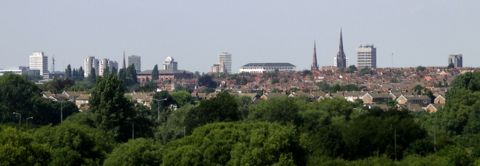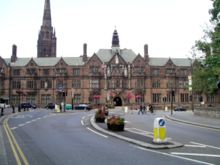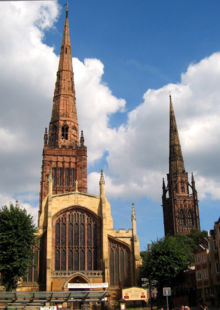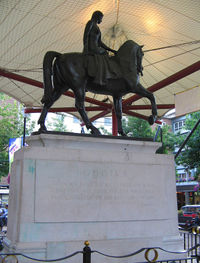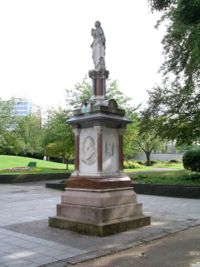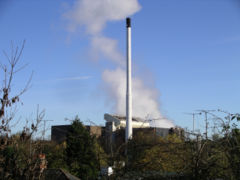Coventry
2007 Schools Wikipedia Selection. Related subjects: Geography of Great Britain
| City of Coventry | |
|---|---|
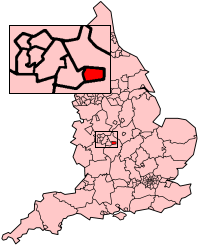 Shown within West Midlands |
|
| Geography | |
| Status: | Metropolitan borough, City (1345) |
| Region: | West Midlands |
| Ceremonial County: | West Midlands |
| Historic Counties: | Warwickshire, County of the City of Coventry |
| Area: - Total |
Ranked 246th 98.64 km² |
| Admin. HQ: | Coventry |
| Grid reference: | SP333790 |
| ONS code: | 00CQ |
| Demographics | |
| Population: - Total (2005 est.) - Density |
Ranked 16th 304,200 3,084 / km² |
| Ethnicity: | 78.0% White 11.3% S.Asian 7.8% Afro-Carib. |
| Politics | |
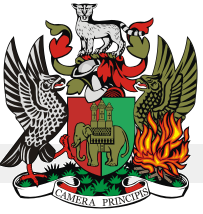 Coventry City Council http://www.coventry.gov.uk/ |
|
| Leadership: | Leader & Cabinet |
| Executive: | Conservative |
Coventry is a city and metropolitan borough, in the West Midlands region of England, UK. With a population of 305,000 (2006 estimate) Coventry is the eighth largest city in England and the eleventh largest in the UK. It is also the second largest city in the English Midlands by population, with residents and those born in the city styling themselves "Coventrians" or in the vernacular "Cov Kids". It is situated 95 miles (153 km) northwest of London and 19 miles (30 km) east of Birmingham and is notable for being further from the coast than any other British city.
Coventry is famous for its involvement in the British motor industry (see Coventry motor companies), its Cathedral and the legendary exploits of Lady Godiva. Over the years Coventry has developed an international reputation as Europe's major city of peace and reconciliation and holds an annual Peace Month. Coventry has two universities: Coventry University and the University of Warwick.
History
Coventry is traditionally believed to have been established in the year 1043 with the founding of a Benedictine Abbey by Leofric, Earl of Mercia and his wife Lady Godiva. Current evidence suggests that this abbey was probably in existence by 1022, therefore Leofric and Godiva most likely endowed it around 1043. In time, a market was established at the abbey gates and the settlement expanded.
By the 14th century Coventry had become an important centre of the cloth trade, and throughout the Middle Ages was one of the largest and most important cities in England. Coventry was granted city status in 1345, and later became a county in its own right.
Hostile attitudes of the cityfolk towards Royalist prisoners held in Coventry during the English Civil War are believed to have originated the phrase "sent to Coventry", which in Britain means "to be ostracised".
In the late 19th century Coventry became a major centre of bicycle manufacture, with the industry being pioneered by Rover. By the early 20th century bicycle manufacture had evolved into motor manufacture, and Coventry became a major centre of the British motor industry.
Coventry suffered severe bomb damage during World War II, most notoriously from a massive German air raid (the " Coventry Blitz") on 14 November 1940. This destroyed most of the historic city centre and Coventry's historic Cathedral. Aside from London and Plymouth, Coventry suffered more damage than any other British city during the Luftwaffe attacks, with huge firestorms devastating most of the city centre. The city was targeted due to its high concentration of armaments, munitions and engine plants which contributed greatly to the British war effort. Following the raids, the majority of Coventry's historic buildings could not be saved as they were in ruinous states or were deemed unsafe for any future use.
In the postwar years Coventry was largely rebuilt under the general direction of the Gibson Plan, gaining a new pedestrianised shopping precinct (the first of its kind in Europe) and the much-celebrated new St Michael's Cathedral in 1962 (incorporating the world's largest tapestry).
Coventry's motor industry boomed in during the 1950s and 1960s. But during the 1970s the British motor industry underwent decline and Coventry suffered badly as a result. By the early 1980s Coventry had one of the highest unemployment rates in the country. In recent years the city has recovered with newer industries locating there. Although the motor industry continues to decline.
Suburbs
Suburbs of Coventry
- Allesley, Ball Hill, Bell Green, Binley, Bishopsgate Green, Canley, Cannon Park, Cannon Hill, Chapelfields, Cheylesmore, Coundon, Earlsdon, Eastern Green, Edgwick, Ernesford Grange, Finham, Foleshill, Hillfields, Holbrooks, Keresley, Longford, Mount Nod, Radford, Spon End, Stoke, Stoke Heath, Stoke Aldermoor, Styvechale, Tile Hill, Walsgrave, Westwood Heath, Whitley, Whoberley, Willenhall, Wood End, Wyken.
Places of interest
St. Michael's Cathedral is Coventry's best-known landmark and visitor attraction. The original 14th century cathedral was largely destroyed by German bombing during World War Two, leaving only the outer walls and spire. The new Coventry Cathedral was opened in 1962 next to the ruins of the old. It was designed by Basil Spence and contains the tapestry Christ in Glory by Graham Sutherland and the bronze statue St. Michael's Victory over the Devil by Jacob Epstein. Benjamin Britten's War Requiem, regarded by some as his masterpiece, was written for the opening of the new Cathedral.
The spire of the ruined cathedral forms one of the Three Spires which have dominated the city skyline since the 14th century, the others being those of Christ Church (of which only the spire survives) and Holy Trinity Church (which is still in use).
Another major visitor attraction in Coventry city centre is the free-to-enter Coventry Transport Museum, which has the largest collection of British-made road vehicles in the world. The most notable exhibits are the world speed record-breaking cars, Thrust2 and ThrustSSC. The museum received a major refurbishment in 2004 which included the creation of a striking new entrance as part of the city's Phoenix Initiative project. The revamp saw the museum exceed its projected five-year visitor numbers within the first year alone, and it was a finalist for the 2005 Gulbenkian Prize.
The Herbert Art Gallery and Museum is a major art gallery in the city centre. About 4 miles from the city centre and just outside Coventry in Baginton is the Lunt Fort, a reconstructed Roman fort. The Midland Air Museum is situated just outside Baginton in Warwickshire on land adjacent to Coventry Airport.
The city's main Police Station in Little Park Street also hosts a museum of Coventry's Police Force. The museum, based underground, is split into two sections - one representing the history of the city's Police Force, and the other compiling some of the more unusual, interesting and grisly cases from the force's history. The museum is funded from charity donations - viewings can be made by appointment.
Major improvements continue to regenerate the city centre. The Phoenix Initiative reached the final shortlist for the 2004 RIBA Stirling Prize and has now won a total of 16 separate awards. Further major developments are potentially afoot, particularly the Swanswell Project, which is intended to deepen Swanswell Pool and link it to Coventry Canal Basin, coupled with the creation of an urban marina and a wide Parisian-style boulevard. A possible second phase of the Phoenix Initiative is also in the offing, although both of these plans are still on the drawing-board.
Coventry City Football Club have also recently started playing at their new home, The Ricoh Arena, a 32,000 capacity stadium in the Foleshill area of the city. The old stadium has now been demolished to make way for new housing.
Education
Coventry has two universities; Coventry University situated on a modern city centre campus and the University of Warwick, which lies 5 km (3 miles) to the south of the city centre on the border with Warwickshire. The University of Warwick is one of only five universities never to have been rated outside the top ten in terms of teaching excellence and research.
Many of the secondary schools in and around Coventry are specialist colleges, such as Finham Park School, which is a Mathematics and IT college and now a teacher training school and The Coventry Blue Coat Church of England School which has recently become a specialist college of Music, one of only a few in the country. Bishop Ullathorne RC School became a specialist college in Humanities in 2006. Woodlands School in Coventry is now also a sports college, which has a newly built sport centre. On the North of the City you can find Exhall Grange School and Science College. Ernesford Grange School, in the South East, is a specialist science college. Pattison College, a private school opened in 1949, specialises in the performing arts.
The Coventry School Foundation is comprised of independent schools King Henry VIII and Bablake together with Coventry Preparatory School.
The Woodlands School, which is an all boys' school, and Tile Hill Wood Girls School are the only single-sex schools left in Coventry. However, their sixth forms have been joined to form the "West Coventry 6th Form", whose lessons take place in mixed classes on both sites.
Arts and culture
- During the early 19th century Coventry was well known to the famous author George Eliot who was born near Nuneaton. The city was the model for her famous novel Middlemarch (1871).
- The Coventry Carol is named after the city of Coventry. It was a carol performed in the play The Pageant of The Shearman and Tailors, written in the 15th century as one of the Coventry Cycle Mystery Plays. These plays depicted the nativity story, the lyrics of the Coventry Carol referring to the Annuciation to the Massacre of the Innocents, which was the basis of the Pageant of the Shearmen and Tailors. These plays were traditionally performed on the steps of the (old) Cathedral, and the plays are believed to have been performed for both Richard III in 1484 and Henry VII in 1584.
- During the late- 1970s and early- 1980s, Coventry was the centre of the Two Tone musical phenomenon, with bands such as The Specials and The Selecter coming from the city, spawning several major hit singles and albums. The Specials achieved three UK #1 hit singles between 1979 - 1981, namely "Too Much Too Young", "Rat Race" and "Ghost Town". Notable Selecter singles included "On My Radio" and "Three Minute Hero".
- Today Coventry is recognised for its range of music events including one of the UK's foremost international jazz programmes, The Coventry Jazz Festival, and the award-winning Godiva Festival. On the Saturday of the Godiva Festival, a carnival parade also starts in the city centre and makes its way to the War Memorial Park where the festival is held.
- In the film The Italian Job, the famous scene of Mini Coopers being driven at speed through Rome's catacombs was actually filmed in Coventry, using what were then the country's biggest sewer pipes. More recently various locations in Coventry have been used in the BAFTA nominated film "Bouncer" starring Ray Winstone, All In The Game, also starring Ray Winstone (Ricoh Arena), the medical TV series Angels (Walsgrave Hospital), the BBC sitcom Keeping Up Appearances (Stoke Aldermoor and Binley Woods districts) and in August 2006 scenes from the forthcoming series of Doctor Who were filmed in the grounds of Bonds Hospital.
Venues
Theatre, art and music venues in Coventry include:
- The Warwick Arts Centre: situated at the University of Warwick, Warwick Arts Centre comprises an art gallery, a theatre, a concert hall and a cinema. It is the second largest arts centre in the UK, after London's Barbican.
- The Belgrade Theatre: one of the largest producing theatres in Britain, the 866 seat Belgrade was the first civic theatre to be opened in the UK following World War II.
- Also currently being built is the Belgrade Plaza.
- The Ricoh Arena : located 5.5 km (3.5 miles) north of the city centre, the 32,000 capacity Coventry City FC stadium is also used to hold major rock concerts for some of the world's biggest acts, including the Red Hot Chili Peppers and Bon Jovi. The adjacent Ricoh Exhibition Hall is a 6,000-seater events venue for hosting a multitude of other acts.
- The War Memorial Park, which holds various festivals including the Godiva Festival, every year.
- The Butts Park Arena, home of Coventry Rugby Football Club, holds music concerts occasionally.
Sport
Sporting teams include Coventry City (Football), Coventry Rugby Club ( Rugby Union), Coventry Blaze ( Ice Hockey), Coventry Bears ( Rugby League), Coventry Godiva Harriers (Athletics), Coventry Bees ( Speedway), Coventry Crusaders (Basketball) and Coventry Cassidy Jets (American Football).
In football, Coventry City won the FA Cup on 16 May 1987 in what is considered to be one of the best finals in the competition's history.
In 2003, Coventry Blaze won the British National League and Playoffs.
2005 was a good year for sport in Coventry. Not only did it become the first city in the UK to host the International Children's Games, and , but 3 of the city sports team won significant honours. The Blaze won the treble consisting of Elite League, playoff and Challenge Cup, the Jets won the BAFL Division 2 championship and were undefeated all season, while the Bees won the Elite League playoffs. Coventry City FC finished a respectable 8th place (of 24) in the Football Championship for the 2005-2006 season, narrowly missing out on the Premiership playoff places.
Famous Coventrians
Arguably Coventry's most famous resident was Lady Godiva, who according to legend, rode through the city naked on horseback, in protest at high taxes being waged on the cityfolk by her husband Leofric, Earl of Mercia. According to the legend, the residents of the city were asked to look away as she rode, but one man didn't and was allegedly struck blind, he became known as Peeping Tom thus originating the term. There is a statue of her in the city centre, which used to stand out in the open but is now somewhat unthoughtfully situated under the much-maligned Cathedral Lanes shopping centre canopy (see right). There is also a bust of Peeping Tom looking out from a bridge that crosses one branch of the shopping precinct.
Other famous people from Coventry include Frank Whittle the inventor of the jet engine, the poet and novelist Philip Larkin, the actors Nigel Hawthorne and Clive Owen, the record producer Pete Waterman, the athlete and former 5,000m world-record holder David Moorcroft, Ian Bell, the Ashes winning cricketer and the 2003 Rugby Union World Cup winners Neil Back and Danny Grewcock. Jerry Dammers writer of the song " Free Nelson Mandela" and the driving-force behind The Specials, Terry Hall, lead singer with The Specials, Fun Boy Three and The Colourfield (and a celebrated solo artist in his own right), George Coles who starred in The Caucasian Chalk Circle, Hazel O'Connor, a rock singer of the 1980s-1990s, Paul King (lead singer of the mid-80s band King), Clint Mansell (lead singer of the 1990s indie band Pop Will Eat Itself), Julianne Regan (lead singer of the 80's-90s band All About Eve), Jason John (aka Jason Herbert) of the 1990s boy band Big Fun, Lee Dorrian, (a founder member of Napalm Death and later Cathedral - both well known bands in the grindcore / death metal and doom metal scenes respectively), and Bolt Thrower, (another band well known in the death metal scene).
In the 19th century the inventor James Starley and his nephew J.K. Starley lived in the city, and were both instrumental in the development of the bicycle, and for starting the British bicycle industry. J.K Starley was also responsible for founding Rover. A statue near Warwick Row commemorates James Starley.
The late politician Mo Mowlam who was famous for being a Northern Ireland secretary grew up in Coventry. Joseph Paxton, the designer of the Crystal Palace, was a Member of Parliament for the city from 1854 to 1865.
Two Tone ska bands The Specials and The Selecter are both from Coventry – one of The Specials' best known hits, Ghost Town is often thought to written about the city. Other bands from the city which found success include The Primitives, Fun Boy Three, The Colourfield, King and The Flys.
2004 Olympics 4x100m relay gold medallist Marlon Devonish is also from Coventry, and in November of the same year he was awarded with an MBE. He also appeared at the opening ceremony of the International Children's Games held in 2005.
Sky Sports presenter Richard Keys, who has presented more than 1,000 football matches making him British television's most presented anchorman.
West End theatre producer and entertainment entrepreneur Dominic Madden, responsible for the re-development of the Elephant and Castle theatre into The Coronet music venue.
The city's list of more infamous individuals includes:
- Porn star Debee Ashby, who achieved notoriety during 1983 when she appeared nude with her mother in an adult magazine.
- Nazi Colin Jordan who led the National Socialist Movement during the 1960s.
Economy
This is a chart of trend of regional gross value added of Coventry at current basic prices published (pp.240-253) by Office for National Statistics with figures in millions of British Pounds Sterling.
| Year | Regional Gross Value Added | Agriculture | Industry | Services |
|---|---|---|---|---|
| 1995 | 3,407 | 3 | 1,530 | 1,874 |
| 2000 | 4,590 | 3 | 1,873 | 2,714 |
| 2003 | 5,103 | 2 | 1,529 | 3,572 |
- ^ Components may not sum to totals due to rounding
- ^ includes hunting and forestry
- ^ includes energy and construction
- ^ includes financial intermediation services indirectly measured
Coventry has long been a centre of motor and cycle manufacturing, dating back from 1896, the car and cycle industry has been a strong centre point for this town. Starting out with some less familiar names such as Coventry Motette, Great Horseless Carriage Co, Swift and more familiar names like Humber, Riley and Daimler and the Triumph motorcycle having its origins in 1902 in a Coventry factory. Although the motor industry has declined, the Jaguar company has its headquarters in the city, and a large Peugeot car factory is located in Ryton just outside the city, although this is set to close in 2007. The famous London black cab taxis are also produced in Coventry by LTI.
Coventry's main industries include: cars, electronic equipment, machine tools, agricultural machinery, man-made fibres, aerospace components and telecommunications equipment. In recent years the city has moved away from manufacturing industries towards business services, finance, research, design and development, creative industries as well as logistics and leisure.
Transport
Coventry is near the M6, M69 and M40 motorways. It is also served by the A45 and A46 roads.
For rail, Coventry railway station is served by the West Coast Main Line, and has regular rail services between London and Birmingham (and stations beyond). It is also served by railway lines to Nuneaton via Bedworth. There is a line linking it to Leamington Spa and onwards to the south coast. Coventry also has 2 Suburban Rail stations in Canley and in Tile Hill.
Bus services in Coventry are operated by Travel West Midlands (under the name Travel Coventry), Stagecoach and Mike de Courcey Travel.
The nearest major airports are Birmingham International Airport, some 17 km (11 miles) to the west of the city and Coventry Airport in Baginton, from which Thomsonfly operates commercial scheduled flights to more than 20 European destinations, located 8 km (5 miles) south of the city centre.
The Coventry Canal terminates near the city centre at Coventry Canal Basin and is navigable for 61 km (38 miles) to Fradley Junction in Staffordshire.
Waste management
Coventry has a large incineration plant which burns rubbish from both Coventry and Solihull and in the process produces electricity for the National Grid and some hot water that is used locally. In addition some rubbish is landfilled.
Coventry City Council is assisting recycling, in line with national trends:
- many areas of Coventry have kerb-side paper and garden-green rubbish collection
- a wide range of rubbish materials can be taken by car to the recycling depot, which is adjacent to the incineration unit
- there are many recycling points throughout the City for paper, glass bottles and metal cans
Politics
Traditionally a part of Warwickshire (although it was a county in its own right for 400 years), Coventry became an independent county borough in 1889. It later became a metropolitan district of the West Midlands county under the Local Government Act (1974), even though it was entirely separate to the Birmingham conurbation area (this is why Coventry appears to unnaturally "jut out" into Warwickshire on political maps of the UK). In 1986 the West Midlands County Council was abolished and Coventry became administered as an effective unitary authority in its own right.
Coventry is still strongly associated with its traditional county, Warwickshire. This may be because of its geographical location, forming a large protrusion into the county.
Coventry is administered by Coventry City Council. The city is divided up into 18 Wards each with three councillors. Coventry has long been considered a stronghold or source of safe seats for the Labour Party. The city council was for years described as a "one party state", but is currently Conservative-controlled since the local elections on 4 May 2006, although the Conservative group held the administration on the casting vote of the Lord Mayor since June 2004. A notable politician serving with Coventry City Council is former Militant Labour MP Dave Nellist who now represents the Socialist Party (England and Wales).
The leader of the controlling Conservative group is Ken Taylor who holds the post of Leader of the Council.
The leader of the opposition Labour group is John Mutton.
Certain local services are provided by West Midlands wide agencies including the West Midlands Police, the West Midlands Fire Service and the West Midlands Passenger Transport Executive (Centro) which is responsible for public transport.
In 2006 Coventry and Warwickshire Ambulance Service was merged with the West Midlands Ambulance Service. The Warwickshire and Northamptonshire Air Ambulance service is based in Coventry, at Baginton Airport.
Coventry is represented in Parliament by three MPs all of whom are Labour. These are:
- Bob Ainsworth - ( Coventry North East)
- Jim Cunningham - ( Coventry South)
- Geoffrey Robinson - ( Coventry North West)
At the Annual Meeting of the City Council on Thursday, 18 May 2006, Councillor Shabbir Ahmed and Mrs Rakizen-ul-Nisa were inaugurated as the Lord Mayor and Lady Mayoress of Coventry for 2006 / 2007. The Lord Mayor was born in the village of Tehsil Kahuta in the Rawalpindi District of Pakistan. Upon arriving in the UK in 1966, he settled initially in Burton-on-Trent until his training in joinery was completed. Later he followed his family to Coventry and completed a Management Course at the University of Warwick. Councillor Ahmed is the city's first Muslim Lord Mayor, and the first Conservative Muslim Lord Mayor in Britain.
Ken Taylor (Conservative) has served as Leader of Coventry City Council since 2004.
The Bishop of Coventry since 1998 has been the Rt Revd Colin Bennetts.
Closest cities, towns and villages
Cities
- Birmingham (30 km / 19 miles)
- Leicester (38 km / 24 miles)
- Lichfield (48 km / 30 miles)
- Wolverhampton (59 km / 37 miles)
Towns
- Bedworth (10 km / 6 miles)
- Kenilworth (10 km / 6 miles)
- Nuneaton (13 km / 8 miles)
- Leamington Spa (16 km / 10 miles)
- Warwick (19 km / 12 miles)
- Rugby (19 km / 12 miles)
- Hinckley (19 km / 12 miles)
- Atherstone (20 km / 12.5 miles)
- Solihull (21 km / 13 miles)
- Southam (21 km / 13 miles)
- Stratford-upon-Avon (32 km / 20 miles)
- Tamworth (32 km / 20 miles)
Villages
- Baginton, about 4 miles south
- Neal's Green/ Ash Green - about 4 miles north
- Burton Green, about 4 miles west
- Binley Woods, about 5 miles southeast
- Stoneleigh, 5 miles south
- Ryton-on-Dunsmore, about 5.5 miles southeast
- Hawkesbury, about 5.5 miles north
- Ansty, about 6 miles north east
- Corley, about 6 miles northwest
- Bulkington, about 6 miles northeast
- Brandon, about 6 miles southeast
- Shilton, about 7 miles northheast
- Berkswell, about 7 miles west
- Balsall Common, about 7 miles west
- Fillongley, about 7 miles north
- Wolston, about 7 miles southeast
- Brinklow, about 7 miles east
- Bubbenhall, about 7 miles southeast
- Meridon, about 8 miles west
- Bramcote, about 8 miles northeast
- Stretton-on-Dunsmore, about 10 miles southeast
- Wolvey, about 10 miles northeast
Coventry is approximately latitudinal with the towns of Aberystwyth (west Wales), Kettering (Northamptonshire), Ely (Cambridgeshire) and Diss (Norfolk).
Postcodes
Postcodes covering the city of Coventry and its immediate suburbs are CV1 to CV6 inclusive. CV7 to CV37 postcodes cover almost the entirety of Warwickshire outside of Coventry, aside from the areas around the towns of Coleshill and Alcester in western Warwickshire.
Twin cities
Coventry was the first ever city to "twin" with another city and hence began the now common worldwide practice of twinning. It started after World War II when Coventry twinned with Dresden as an act of peace and reconciliation, both cities having been heavily bombed during the war. Each twin city country is represented in a specific ward of the city and in each ward has a peace garden dedicated to that twin city.
Coventry is now twinned with 26 places across the world:
| Flag | City | Country | Year Twinned | Ward |
|---|---|---|---|---|
| Parkes, New South Wales | Australia | 1956 | ||
| Graz | Austria | 1957 | Binley & Willenhall | |
| Sarajevo | Bosnia Herzegovina | 1957 | ||
| Cornwall, Ontario | Canada | 1972 | ||
| Granby, Quebec | 1963 | |||
| Windsor, Ontario | 1963 | |||
| Jinan | China | 1983 | ||
| Lidice | Czech Republic | 1947 | ||
| Ostrava | 1959 | |||
| Caen | France | 1957 | ||
| Saint-Etienne | 1955 | |||
| Dresden | Germany | 1959 | Lower Stoke | |
| Kiel | 1947 | |||
| Dunaujvaros | Hungary | 1962 | ||
| Kecskemet | 1962 | |||
| Bologna | Italy | 1960 | ||
| Kingston | Jamaica | 1962 | ||
| Arnhem | Netherlands | 1958 | ||
| Warsaw | Poland | 1957 | ||
| Cork | Republic of Ireland | 1958 | ||
| Galaţi | Romania | 1962 | ||
| Volgograd | Russia | 1944 | ||
| Belgrade | Serbia | 1957 | ||
| Coventry, Connecticut | USA | 1962 | ||
| Coventry, New York | 1972 | |||
| Coventry, Rhode Island | 1971 |

